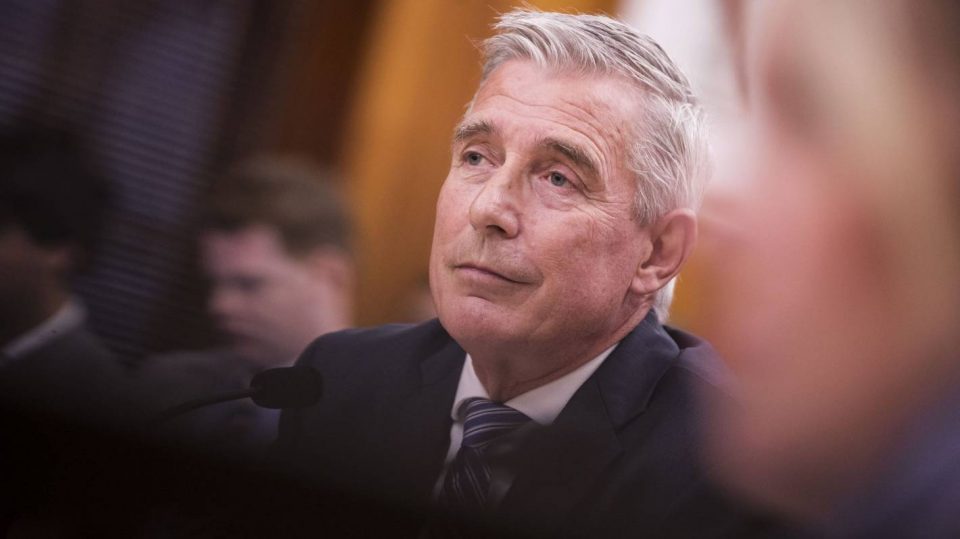ROBERT KITCHIN/Stuff
Air NZ Chief executive Greg Foran faces a select committee in Parliament on Friday over the Saudi Navy contract and the future of Air NZ.
OPINION: The revelation that Air New Zealand helped the Saudi Arabian military through a third-party contract has made New Zealand businesses nervous. Do you really know who you are working for?
Air New Zealand, apparently with no knowledge, was acting as a ‘pit-stop’ for the Saudi military, helping to get their war machine back on track, so they can return to preventing food and medicine getting into Yemen.
Yemen has turned into one of the largest humanitarian emergencies in our lifetime. Covid is making it worse. Eighty per cent of Yemen’s population require aid, half of them children. People are dying from hunger and deprivation and facing acute food insecurity.
It’s shocking that one of New Zealand’s most recognisable companies, flying our flag, has found itself accidentally facilitating Saudi Arabia’s blockade of Yemen.
READ MORE:
* Call for Air NZ executives to reveal other military deals after ‘not acceptable’ Saudi contract
* Air New Zealand cancels Saudi contract, ‘returns job incomplete’
* Air NZ apologises after revelations it helped Saudi Arabian military
We can prevent this happening in the future.
While the Ministry of Foreign Affairs and Trade is looking into export control order obligations, the fact is that internal supply chain due diligence processes should have picked this up.
New Zealand has no supply chain transparency legislation, which means that our national companies working globally can find themselves complicit in contracts that contravene human rights. They can also import products or services that exploit and enslave people through suppliers or third-party contracts.
Helping the despots do bad things is wrong. It’s also bad for your reputation. Brand credibility is everything, and companies like Air New Zealand cannot afford to take the risk of bad publicity.
Many countries, including eight in the European Union, are working on draft legislation for supply chain due diligence, and a proposal to make due diligence mandatory could be available as early as this year.
The United Kingdom and Australia have passed ‘Modern Slavery Acts’ that require companies to map out their supply chains, identify risks and put in place mechanisms to mitigate these in collaboration with other companies.
But there’s no indication that New Zealand is following suit. New Zealand is usually a leader in social innovative reforms, so why is it lacking here?
Hani Mohammed/AP
Smoke rises after an airstrike by the Saudi-led coalition on an army base in the Yemeni capital of Sana’a in 2015. Yemen’s war, which has killed more than 100,000 people and resulted in desperate food shortages, began in September 2014, when the Houthis seized the capital. Saudi Arabia entered the war alongside Yemen’s internationally recognised government in March 2015.
Legislation would require companies to identify which sectors, types of products and services, countries and entities may involve high risk. It would require them to identify parts of business operations that don’t have good visibility and ask whether risk lies there too, and then put mechanisms in place to mitigate this risk. Often this means asking for information from your direct suppliers about sub-suppliers and sub-contractors.
In other words, Air New Zealand would be required by law to ask about the mysterious ‘third-party contractor’ it was really working for, even if they didn’t have a direct contract with the Saudi military.
It has never been more important for New Zealand companies to make sure they are not contributing to human rights abuses. Consumers and shareholders now insist on better supply chain visibility. When our national airline doesn’t know it’s contributing to the worst famine in the world today, then our reputation as New Zealanders is tarnished. If countries like ours are not looking out for vulnerable people in the supply chains of our best companies, then who is?
Business has a responsibility to make good decisions and ensure strong processes are in place that don’t cause more harm to people. The New Zealand Government has an obligation, in our name, to protect and uphold human rights. It needs to be a ‘fast follower’ if not a ‘global leader’ in supply chain due diligence legislation for New Zealand. Otherwise there will be more such scandals.
Campbell Garrett is the Office Manager, Research and Policy, at the Council for International Development, the umbrella organisation for New Zealand’s aid charities. CID members World Vision and Trade Aid are leading the call for a New Zealand Modern Slavery Act.


